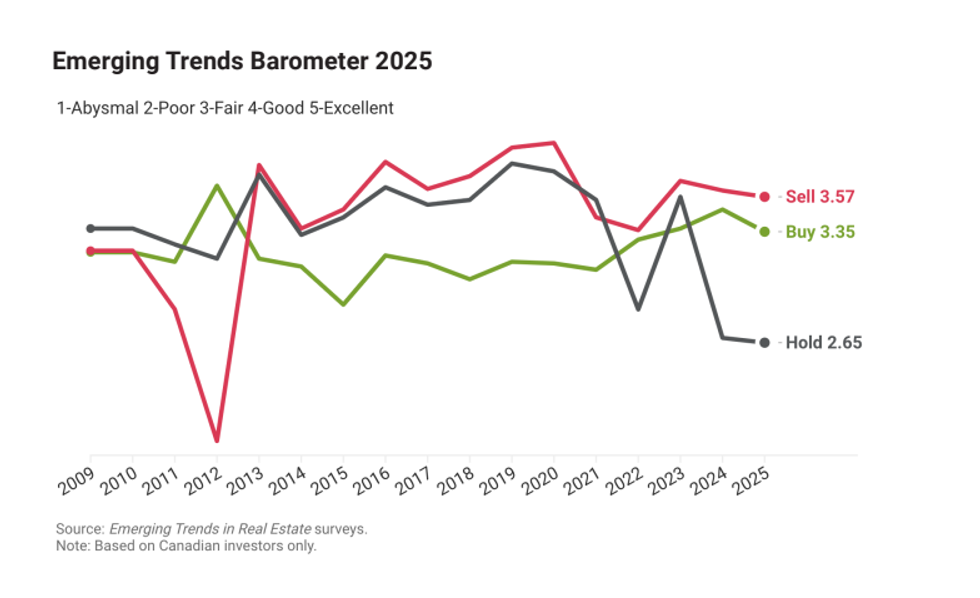There’s no sugarcoating the fact that it isn't exactly the most inspiring time for Canada’s real estate investors (or would-be real estate investors). Between sky-high interest rates, pricey costs to build new homes, labour shortages, heightened geopolitical risks, and stalled condo markets in cities like Toronto and Vancouver, real estate has taken a backseat to other investment opportunities.
There is, however, room for optimism. It just may require some adaptability when it comes to the direction of investment dollars.
This year’s PwC Canada and Urban Land Institute’s (ULI) Emerging Trends in Real Estate (ETRE) report identifies opportunities for investors in 2025. While the outlook is mixed, new asset classes, generative AI, and regional differentiation offers a bright spot in the year ahead.
“Canadian real estate companies are closely monitoring catalysts like declining interest rates, government policy changes, and business model reinvention to reinvigorate investment and development,” said Fred Cassano, Partner, National Real Estate Leader, PwC Canada.
With an overall fairly optimistic tone, the report suggests that, while there's no denying the current housing affordability crisis, the Canadian real estate market is at the end of a declining cycle. Once interest rates drop further, it forecasts that we'll see "slow growth improvement and, two years out, tremendous growth."
The report identifies five key emerging trends in the Canadian real estate market.
Shifting Investment Focus
We’re not out of the woods yet; capital constraints will continue to be a trend heading into 2025. With tighter lending and capital scarcity, private investors, including family offices and high-net-worth individuals, are eyeing distressed real estate opportunities. As the report highlights, those willing to take a chance on distressed real estate — that facing financing gaps or challenges — will find opportunities in the coming year.
"In addition to filling refinancing gaps, some are moving up in the capital stack and providing mezzanine finance, tranche credit, and subordinate debt — frequently in syndication with other family offices and outside real estate organizations," reads the report. "This approach mitigates financial risk by pooling capital. Strategic partnerships can also help family offices develop internal skills and experience in evaluating opportunities, executing deals, and managing risks."
Generative AI is Becoming More Critical
While real estate was historically a slow industry to adapt and evolve on the technology front, that’s changing, with generative AI (GenAI) front and centre. The report highlights how GenAI is streamlining real estate tasks like architectural design, land due diligence, and rental market monitoring, enhancing efficiency amid economic pressures. This presents an opportunity for organizations to maximize efficiencies and accelerate innovation, despite our current climate of business and capital pressures.
“Companies are now exploring new technologies such as GenAI to enable productivity improvements," says Cassano. "The use of generative AI in the real estate sector, though still evolving, offers significant competitive advantages.”
Among the report's interviewees who are adopting the technology, many are finding concrete applications for it. "One interviewee is using it to create architectural renderings much faster than in the past; another said the technology is helping developers with land due diligence. Some are looking to use generative AI to boost revenues: one interviewee is developing an application that can monitor rental supply and demand trends to help adjust rents based on geographic location," reads the report.

Emerging Asset Classes Are Becoming More Attractive
Emerging asset classes are becoming more attractive to investors, outlines the report. With the traditional real estate market slowing down in cities like Toronto and Vancouver, niche assets like data centres, cold storage facilities, and student housing are gaining traction and investors’ dollars. The report highlights how these unique – and perhaps previously overlooked – investment opportunities fuse real estate with infrastructure needs and appeal to investors who can think outside the box to capture significant value.
"The emergence of niche property types, such as data centres and cold-storage facilities, is a notable trend," says Cassano. "These properties are becoming prime investment opportunities for 2025. Data centres are in high demand due to the increasing need for computing power driven by technologies like generative AI, cloud computing, and the Internet of Things. Similarly, the demand for cold-storage facilities is rising, fueled by the need for fresh and frozen food, online grocery shopping, and meal kit delivery services. This shift towards specialized investments highlights a broader transformation in the real estate market, where traditional asset classes like office and retail are being supplemented by more specialized properties."
Infrastructure investments, like those in digital connectivity (i.e. GenAI) and sustainable energy, are also gaining traction, as investors increasingly recognize the stable cash flow and diversification benefits offered. The report highlights how this shift reflects a broader trend towards integrating real estate with infrastructure to meet evolving economic and technological needs – one we will see more of.
"2025 will be about taking a fresh approach to investment and development,” said Richard Joy, Executive Director, Urban Land Institute, Toronto. “Capitalizing on newer opportunities like GenAI and data centres requires real estate players to act with creativity and conviction, which may involve developing new capabilities, forging strategic partnerships, and entering new markets.”

Sustainability is Key
There’s no denying the impacts of climate change on dramatic weather events, and this can impact the real estate market. That’s why sustainability is more than a nice idea — it’s crucial for the long-term resilience of real estate, thanks to increasing risks like wildfires, floods, and hurricanes. As the report drives home, these events threaten property values, causing investors to consider climate resilience in asset pricing and insurance costs. So, sustainable practices like energy-efficient systems not only mitigate risks but also offer market differentiation and attract sustainably-minded tenants.
Cassano says that the emphasis on sustainability is therefore reshaping investment strategies and operational practices within the real estate sector. "The increasing frequency and severity of climate-related disasters are prompting companies to integrate climate risk and resilience assessments into their due-diligence processes, insurance evaluations, and climate disclosures," says Cassano. "Real estate companies who are ready to take the lead on climate resilience can start with a portfolio-level analysis. In times of significant business pressures, competing priorities, and complex assets, creative deal-making and expert operations become essential for success.”

Foreign Investors Eye Canadian Real Estate
The foreign investors are back in the game. According to the report, Canadian real estate will see a resurgence in dealmaking from foreign investors with available capital. These investors are expected to take advantage of emerging distress in real estate with less domestic competition for these assets, including investments in multifamily and industrial properties.
Naturally, investment opportunities differ throughout the country. According to the experts, Western Canada, particularly Calgary and Edmonton, continue to emerge as top markets to watch. Unlike the notoriously pricey regions of Vancouver and the Greater Toronto Area (GTA), housing affordability is a strong draw to both Alberta cities. At the same time, this region also faces increasing climate-related concerns, making sustainability a growing focus.
"Calgary is identified as a top market to watch from an investment perspective due to its strong economy, home ownership affordability, energy sector, growing tech community, and rapid population growth," says Cassano. "Multi-family apartments is an investment best bet, driven by population growth and the relative affordability of rental housing compared to homeownership."
In general, Cassano says that, while the Canadian real estate market presents a mixed outlook, there are promising signs that should make investor optimistic.
"Despite some softening, the industrial market remains attractive, especially for warehouse space, distribution centres, small-bay industrial space, and niche assets like data centres and cold storage facilities," he says. "There is optimism in the office market, where there is growing demand for newer, high-quality spaces, while older buildings struggle. The retail sector also continues to show signs of recovery, particularly in grocery-anchored neighbourhood shopping centers and properties with necessity-based retail offerings. The market's outlook will depend on interest rate trends, capital availability, and the adaptability of real estate companies to seize emerging opportunities."






















